mercredi, 04 janvier 2017
1944 : le corps expéditionnaire brésilien en Italie
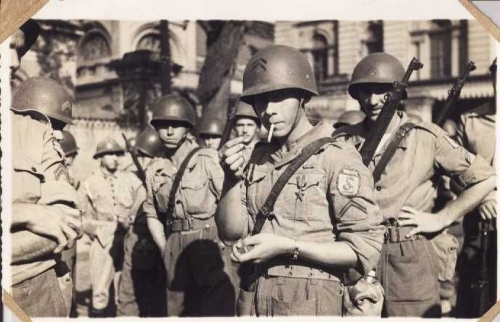
Erich Körner-Lakatos :
1944 : le corps expéditionnaire brésilien en Italie
Plusieurs congrès panaméricains ont eu lieu dans les années 1939 et 1940. Les négociateurs se sont mis d’accord pour respecter le principe de la « solidarité hémisphérique », laquelle consistait en une nouvelle doctrine de Monroe, assortie de l’interdiction de toute menée belliqueuse dans une zone de 300 miles autour du Nouveau Monde. Toute attaque perpétrée par un Etat non américain contre un pays de l’hémisphère occidental serait considérée comme une attaque contre l’ensemble des Etats signataires.
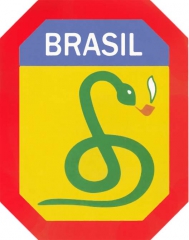 Dans la nuit du 22 août 1942, les torpilles d’un sous-marin allemand envoient au fond de la mer cinq vapeurs brésiliens patrouillant le long des côtes. Il y a 610 morts. Quelques heures après ce terrible incident, le Brésil déclare la guerre à l’Allemagne et à l’Italie. Le parallèle avec la première guerre mondiale saute aux yeux. A cette époque-là, en 1917, le torpillage de navires civils, dont le navire amiral de la flotte commerciale brésilienne, le Paranà, par des sous-marins de Guillaume II, fut aussi considéré comme un casus belli par le Brésil.
Dans la nuit du 22 août 1942, les torpilles d’un sous-marin allemand envoient au fond de la mer cinq vapeurs brésiliens patrouillant le long des côtes. Il y a 610 morts. Quelques heures après ce terrible incident, le Brésil déclare la guerre à l’Allemagne et à l’Italie. Le parallèle avec la première guerre mondiale saute aux yeux. A cette époque-là, en 1917, le torpillage de navires civils, dont le navire amiral de la flotte commerciale brésilienne, le Paranà, par des sous-marins de Guillaume II, fut aussi considéré comme un casus belli par le Brésil.
En déclarant la guerre aux puissances de l’Axe Rome-Berlin, le plus grand Etat d’Amérique latine met un terme à sa politique de neutralité. Dans le fond, le Président brésilien Getùlio Vargas préfèrerait garder son pays hors du conflit. Depuis des mois, cet excellent tacticien évite de faire le jeu des Etats-Unis et fait monter les enchères pour monnayer sa participation à la guerre.
Au Brésil, à l’époque, il y a beaucoup de sympathisants de l’Axe : le chef de l’état-major général, Goes Monteiro et une bonne part du corps des officiers refusent toute participation à la guerre mondiale. Le ministre de la guerre Enrico Gaspar Dutra rejette la proposition américaine de construire des bases sur le territoire brésilien. Dutra parle un langage sans ambigüités : « Si Washington débarque des troupes sans en avoir reçu l’autorisation préalable, les militaires brésiliens ouvriront le feu ».
Vargas, habile tacticien, donne à réfléchir à ses généraux : si le Brésil participe au conflit, des capitaux américains couleront à flot dans le pays, permettant notamment de construire le gigantesque complexe sidérurgique de Volta Redonda dans l’Etat de Rio de Janeiro, ce qui constituera un atout majeur pour le développement futur du Brésil. Grâce à la construction de ce complexe, il sera possible d’exploiter les immenses réserves de minerais de l’intérieur du pays. L’économie brésilienne recevra là un formidable coup de fouet et les 93.000 hommes des forces armées feront l’expérience du combat sur le théâtre des opérations en Europe.
Cette expérience acquise sera de toute première importance face au rival du Brésil, l’Argentine, où un gouvernement militaire intransigeant et favorable à l’Axe maintient le pays dans la neutralité. En effet, il a fallu attendre les toutes dernières semaines de la guerre en Europe pour convaincre enfin Buenos Aires d’envoyer une déclaration de guerre toute formelle à l’Allemagne. Ce sera fait le 27 mars 1945. L’Argentine sera ainsi le dernier pays à avoir déclaré la guerre au Reich. D’autres pays latino-américains avaient déclaré la guerre à Berlin en février 1945, notamment le Venezuela, le 16 février. En revanche, les pays plus inféodés aux Etats-Unis en Amérique centrale et dans les Caraïbes avaient déjà formellement déclaré la guerre aux puissances de l’Axe les 11 et 12 décembre 1941 (Cuba, la République Dominicaine, le Guatemala, le Nicaragua, Haïti, le Costa Rica, le Honduras et El Salvador). Ce qui fut le plus mobilisateur dans ces déclarations de guerre fut bien sûr la possibilité de confisquer les avoirs allemands et italiens.
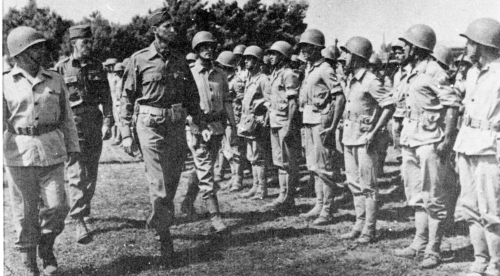
En entrant en guerre aux côtés des Etats-Unis, Vargas, de figurant instable, se mue automatiquement en un allié important. Même Churchill change d’opinion à son sujet : il le méprisait et le traitait de « caudillo aux petits pieds » ; en un tournemain, il devient le « combattant d’avant-garde de la solidarité panaméricaine ».
En très peu de temps, le Brésil se transforme en l’une des principales bases de ravitaillement et d’approvisionnement des alliés occidentaux. Natal, la ville située sur la pointe extrême-orientale du pays, devient l’aéroport militaire le plus vaste du monde. Le gouvernement de Rio livre des matières premières stratégiques (du fer, du manganèse, du nickel, du zinc) et des quantités impressionnantes de viande et de céréales aux belligérants occidentaux.
Ce ne sera pas tout. Vargas met également des troupes à disposition. Equipé et entraîné par les Anglo-Américains, un contingent s’embarque pour l’Italie entre juin et septembre 1944 et engage le combat aux côtés de la 5ème Armée américaine du Général Clark. La « Força Expeditionària Brasileira » (FEB) sera placée sous les ordres du Général Mascarenhas de Morais et comptera dans ses rangs 25.300 hommes d’infanterie et un escadron de chasseurs de la force aérienne.
La FEB s’est bien battue contre les troupes solidement éprouvées de la Wehrmacht, toutefois après avoir subi des pertes sensibles au début des engagements. A l’automne 1944, l’avance des troupes alliées est bloquée au nord de Florence. Les Allemands se replient et s’arcboutent sur la « Ligne Gothique » entre La Spezia et Rimini et tiennent le front jusqu’à la Pâque 1945.
Les soldats brésiliens passeront l’hiver sur leurs positions dans les Apennins. Le climat est rude pour ces soldats venus des tropiques et la FEB enregistre de nombreuses pertes dues aux gelures. Le 9 avril 1945, les Américains lancent leur contre-offensive du printemps. Les troupes brésiliennes y participent et avancent, lors de la phase finale de la campagne d’Italie, en direction d’Alessandria et de Turin. A la fin du mois d’avril 1945, la 148ème Division d’infanterie de la Wehrmacht se rend aux Brésiliens.
Les combats de la FEB se sont étendus sur huit mois et ont coûté la vie à 454 soldats. 2722 autres ont été blessés. Les morts de ce corps expéditionnaire reposent dans un cimetière militaire à Pistoia, une petite ville de Toscane. Au Brésil, un monument à Rio rappelle leur sacrifice, de même qu’un musée à Curitiba (dans l’Etat de Paranà).
Erich Körner-Lakatos.
(Article paru dans « zur Zeit », Vienne, http://www.zurzeit.at , n°36/2016).
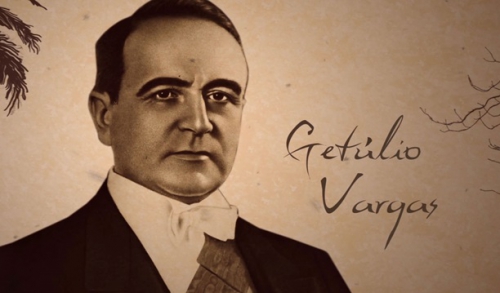
L’Estado Novo de Vargas
Getùlio Dornelles Vargas est arrivé au pouvoir au Brésil en 1930. Fin novembre 1935, les communistes se soulèvent à Rio. Leur rébellion est rapidement anéantie. Le Président n’est pas plus tendre avec l’extrême-droite : les activistes de l’Açao Integralista Brasileira (Action Intégraliste Brésilienne : AIB), vêtus de chemises vertes, essaient en mai 1938 de renverser le président, en prenant son palais d’assaut. Vargas n’admet pas cette rupture de la paix civile, considère que cette rébellion est un affront à sa personne et mate cruellement l’insurrection dirigée par Plinio Salgado, théoricien et animateur du « fascisme intégraliste ».
Le 10 novembre 1937, Vargas proclame, par décret, l’instauration de l’ Estado Novo (l’Etat nouveau), aux traits autoritaires et corporatistes : l’article 180 de la nouvelle constitution admet très nettement le « principe du chef ». Le modèle de Vargas est celui de la mère patrie portugaise, dirigée par Antonio de Oliveira Salazar. Il y a néanmoins une différence : Salazar tient son autorité de Dieu, sans fausse modestie. Vargas, lui, dit se contenter de tenir la sienne du peuple.
Vargas se pose comme un nationaliste brésilien. C’est pourquoi, dès avril 1938, il interdit les activités de la NSDAP allemande à l’étranger qui connaissait un indéniable succès au sein de la minorité allemande. L’Etat nouveau entend « brasilianiser » les immigrants. Tout enseignement en une langue autre que le portugais est interdit pour les enfants de moins de 14 ans. Les autorités reçoivent l’ordre d’éviter toute concentration d’immigrants de même nationalité. Ces mesures concernent également les minorités allemandes dans le sud du pays (EKL).
19:35 Publié dans Histoire | Lien permanent | Commentaires (0) | Tags : histoire, deuxième guerre mondiale, seconde guerre mondiale, brésil, amérique latine, amérique du sud, panaméricanisme, estado novo brésilien, getulio vargas |  |
|  del.icio.us |
del.icio.us |  |
|  Digg |
Digg | ![]() Facebook
Facebook
samedi, 07 décembre 2013
The Monroe Doctrine is History, But the Empire is Attacking Everywhere
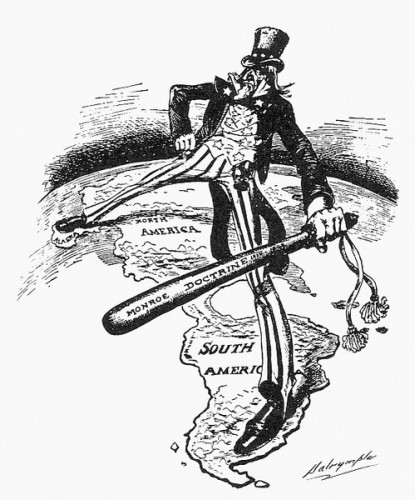
The Monroe Doctrine is History, But the Empire is Attacking Everywhere
| Nil NIKANDROV - Ex: http://www.strategic-culture.org |
|
U.S. Secretary of State John Kerry has announced the end of «the era of the Monroe Doctrine». On November 18 he gave a keynote speech on partnership with Latin America at the headquarters of the Organization of American States in Washington. For almost 200 years U.S. policy in the Western Hemisphere has been based on the doctrine named after the fifth president of the U.S., James Monroe, which declares that the countries of Latin America should not be seen by European powers as objects of colonization… «America for the Americans» - the United States used this slogan to mask the imperialist essence of the doctrine, which was used in the Cold War years to counter «Soviet expansion». The Monroe Doctrine has been used to justify the suppression of revolutions in Guatemala and Chile, the physical elimination of popular leaders, and military operations against guerillas in Cuba, Nicaragua and other countries… The key point of Kerry's speech was the assertion that in today's historical conditions, the U.S. views the states south of the Rio Grande as «equal partners» which must «promote and protect...democracy,» «sharing responsibilities [and] cooperating on security issues». It is difficult to interpret these wordings clearly. On the one hand, Washington seems to be stating that it will not resort to armed intervention in the region to defend its «vital interests». On the other hand, the statements about «sharing responsibilities» and «cooperating on security issues» sound quite equivocal. Cooperating with whom, exactly? Against whom? And on what terms? However, against whom the «cooperation on security issues» is to be directed follows from the speech itself. Kerry assailed Venezuela and Cuba with criticism. In his opinion, «democratic institutions are weakened» in Venezuela. Most likely Washington is irritated by the fact that the National Assembly voted to give President Nicolas Maduro special powers which he has already begun to use to stop the economic war on Venezuela (speculation, hoarding consumer goods and food, and undermining the purchasing power of the national currency, the bolivar). Venezuelans approve the measures being taken by President Maduro. The authority of the Bolivarian leadership has grown noticeably. In Cuba the head of the State Department is dissatisfied with the pace of the democratic process. Kerry stated that the U.S. hopes these processes will gain speed, that «the Cuban Government embraces a broader political reform agenda that will enable its people to freely determine their own future». And the U.S. would very much like the process of democratization in Cuba to take on a landslide-like character, similar to the process which destroyed the USSR. The U.S. has shelved the Monroe Doctrine, but it has not given up pressuring Latin American countries or conducting complex operations to destabilize them. Targeted propaganda attacks are carried out against undesirable leaders. Streams of slander pour down on Bolivian President Evo Morales, first and foremost because of his government’s «insufficient efforts» in fighting against illegal coca plantations and drug trafficking. And this when Bolivian intelligence agencies are battling fiercely with drug cartels financed, as a rule, though banks controlled by U.S. businessmen and the Drug Enforcement Administration (DEA). Morales gives as good as he gets, confident that the best defense is a good offence. He has more than once advocated handing over Barack Obama to a «tribunal of the peoples» to be tried for «crimes against humanity». His accusations were loudest of all in his address at the 68th session of the UN General Assembly. The Bolivian president claims that in order to maintain its dominant position in the world, the U.S. makes use of the most criminal of methods, extensively organizing conspiracies and assassination attempts. Morales has reduced contacts with representatives of the U.S. to a minimum, preferring to conduct business with China, Western European countries, Russia and Belarus. The president of Bolivia has threatened, «If we need to, we will close the U.S. embassy altogether». Washington has never ceased its hostile activities against Ecuador. After the CIA's failed attempt to get rid of President Rafael Correa using agents in the Ecuadorian police, the U.S. embassy is sparing no efforts to «reform» him. Adam Namm, the American ambassador in Quito, criticized President Rafael Correa for cultivating closer relations with Iran and Belarus. The response was immediate: «I am not surprised at his [Namm's] pronouncements, because the diplomat is new at these issues. Ecuador will not ask permission from anyone to maintain sovereign relations with whatever countries it wishes. It is enough to note how many countries where absolutely no elections are held at all have privileged relations with the United States. Absolute monarchies! So that's enough! We are not anyone's colony. While I am the president of this country, there will be no neocolonialism!» Correa's harsh comments on Obama's pronouncements about the «exceptionalism of the American people», who are supposedly concerned with protecting the interests of «all humanity», are also conspicuous. The Ecuadorian president compared these claims with the «Nazi policy» of the Third Reich. In October Correa visited Russia, where he discussed, among other things, armaments cooperation issues and shipments of Russian armaments to Ecuador, in particular air defense systems, as well as an additional shipment of Mi-171E transport helicopters. Russia is interested in implementing several large oil and gas projects in Ecuador. The Ecuadorians are discussing prospects of intensifying military cooperation with China; recruiting Chinese specialists for the construction of an oil refinery (Refineria del Pacifico), to be completed in 2017, has also been proposed. Even now there are 60 Chinese companies working in Ecuador in the mining industry and road infrastructure construction. All of this is causing great concern in Washington, which is why the spying activities of American intelligence agencies have intensified in Ecuador. According to the site Contrainjerencia.com, in 2012-2013 the number of CIA personnel at the Ecuadorian station doubled. Agents with experience in subversive operations in Latin America are being sent to Ecuador: U. Mozdierz, M. Haeger, D. Robb, H. Bronke Fulton, D. Hernandez, N. Weber, A. Saunders, D. Sims, C. Buzzard, М. Kendrick and others. The problems which Washington is now having with Brazil and Argentina due to the scandalous revelations regarding the wiretapping of these countries' presidents, Dilma Rousseff and Cristina Fernandez de Kirchner, have yet to be resolved satisfactorily. The Americans have still not really apologized for the total espionage in these countries. And the espionage not only has not stopped, it has become more subtle, forcing national intelligence agencies to develop joint measures to combat the operations of the CIA, the NSA and U.S. military intelligence. At the same time, steps are being taken to create a system for fighting electronic espionage within the framework of the Union of South American Nations (UNASUR). In Mexico and the countries of Central America and the Caribbean Basin, American intelligence run things with almost no interference, unless you count Cuba and Nicaragua, whose counterintelligence agencies occasionally strike painful blows against the CIA's agent network. Today the most important task for U.S. military and intelligence agencies is maintaining control of Honduras, which is often called the «unsinkable aircraft carrier of the U.S.» in Central America. There are already U.S. military bases located on the territory of Honduras, but the Pentagon is planning to build new air and naval bases. Washington's cynical interference in the election campaign which just took place in Honduras is yet another signal from the Obama administration to Latin America: we will protect our interests at any cost; no other outcome is acceptable to us. The «U.S.'s man» in the elections in Honduras is Juan Orlando Hernandez, the candidate from the conservative National Party. For over three years he headed the National Congress and contributed greatly to the consolidation of political forces hostile to ex-president Manuel Zelaya and his wife Xiomara Castro. It is she who was his main competitor in the elections as the candidate for the center-left Liberty and Refoundation Party (LIBRE). Hernandez supported the 2009 military coup d’état which led to the overthrow of Zelaya, maintains close ties with the military, and facilitated the expansion of the «security» functions of military personnel, including in fighting drug trafficking. For the U.S. embassy, not allowing Xiomara Castro to come to power is a matter of principle. Upcoming events will show how it will be resolved. In a radio interview with Radio Globo, Manuel Zelaya stated, «Xiomara has won the fight for the post of president of the republic. They [the Supreme Electoral Court of Honduras] are stealing the victory from Xiomara Castro. The Court's count does not stand up to statistical analysis. We do not acknowledge this result; we reject it». Lisa Kubiske, the U.S. ambassador in Honduras, actively interfered in the election process in order to guarantee victory for Hernandez. In essence, it is she who is Xiomara Castro's main rival. Whether the U.S. embassy will be able to ensure that Hernandez comes to power will be seen in the near future. But there is already information in the international media that in the process of counting the votes, he is leading by a wide margin. |
00:05 Publié dans Actualité, Géopolitique | Lien permanent | Commentaires (0) | Tags : actualité, géopolitique, politique internationale, états-unis, doctrine de monroe, américanisme, panaméricanisme |  |
|  del.icio.us |
del.icio.us |  |
|  Digg |
Digg | ![]() Facebook
Facebook


